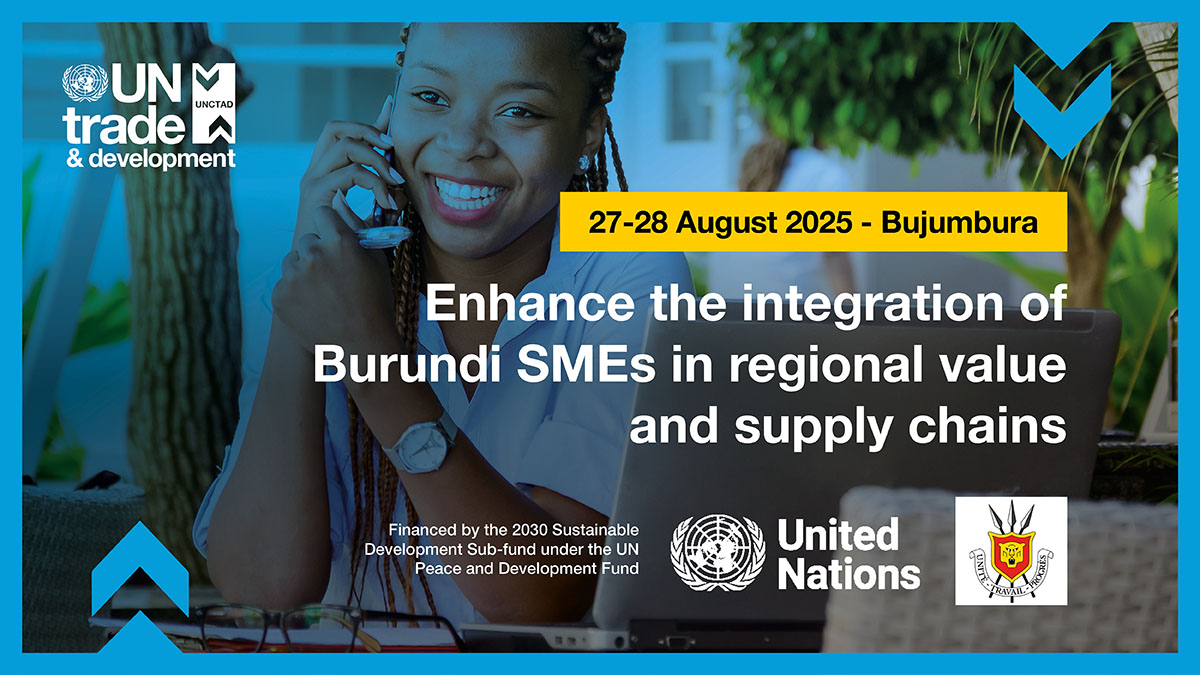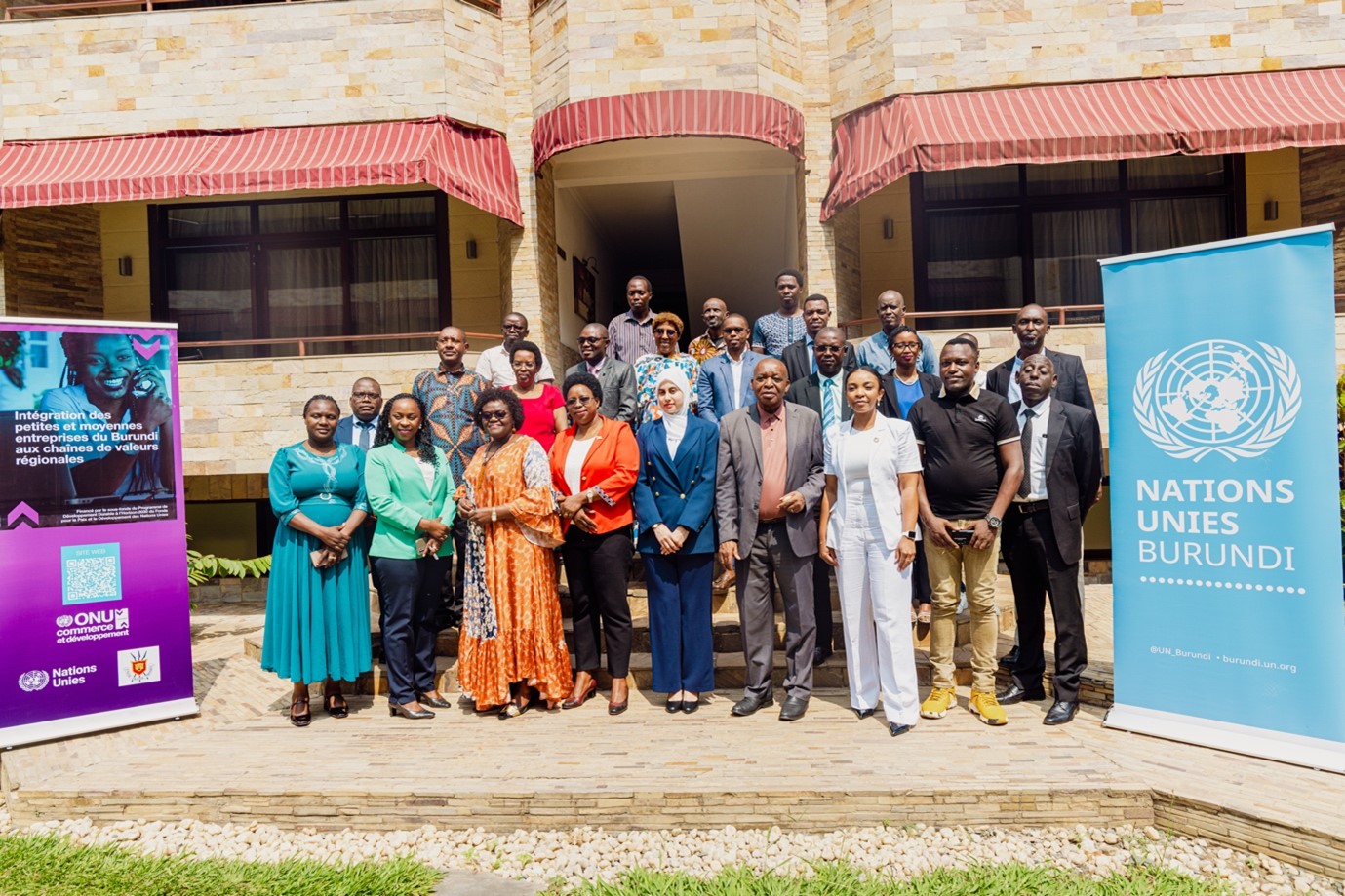
In collaboration with the Bureau d’Étude Stratégique et de Développement (BESD), the Ministry of Energy, Mining, Industry, Trade and Tourism, and the United Nations Resident Coordinator’s Office in Burundi, UNCTAD organized a national workshop on 27–28 August 2025 at the Roca Golf Hotel in Bujumbura.
Held within the framework of the UNCTAD project “Enhancing the capacity of African vulnerable countries in adopting policy incentives and innovative instruments for the participation of SMEs in regional value chains”, the workshop aimed to launch the project in Burundi, and review and validate the preliminary findings of the national impact study on the participation of Burundi SMEs in regional value chains under the African Continental Free Trade Area (AfCFTA).
The workshop was opened by Ms. Christine Niragira, Permanent Secretary at the Ministry of Energy, Mining, Industry, Trade and Tourism, alongside Ms. Clara Mah Anyangwe, UN Resident Coordinator a.i., and Mr. Denis Nshimirimana, Secretary General of the Federal Chamber of Commerce and Industry of Burundi. In her remarks, Ms. Niragira reaffirmed the government’s commitment to structural economic transformation through its Vision 2040 “Emerging Burundi” and Vision 2060 “Developed Burundi”, emphasizing trade promotion and export development as pillars of industrialization and employment.
Ms. Anyangwe highlighted Burundi’s potential as a member of the East African Community (EAC), the Common Market for Eastern and Southern Africa (COMESA) and the African Continental Free Trade Area (AfCFTA), but underscored persistent challenges facing SMEs: high production costs, limited access to finance, regulatory barriers and lack of market information. She called for active stakeholder contributions to finalize the national study.
The study, presented by national and international consultants, revealed that while SMEs represent over 90% of Burundi’s private sector, yet they contribute only about 17% of GDP. Key opportunities were identified in agro-processing (tea, coffee, leather), niche agricultural products, and light manufacturing sectors such as glassmaking. Tea remains Burundi’s flagship export but faces productivity and branding challenges, while the glass sector is slowly reviving after decades of decline.
The analysis also highlighted Burundi’s comparative advantages in products such as tanned leather, black tea, tin ores, coffee and raw hides. Short- and medium-term opportunities include higher value-added agro-products, fruits, beverages, and selected industrial and mining goods.
Over 30 participants from government institutions, SMEs, financial institutions and development partners engaged in thematic working groups. Key recommendations included:
- Developing dedicated structures and tailored financial instruments for SMEs;
- Establishing a single window for exporters and investors;
- Strengthening SME legal and institutional frameworks, including clearer definitions and specialized tribunals;
- Building SME capacity in business planning, marketing, certification, and quality standards;
- Enhancing coordination, market access and logistical competitiveness.

Photo: Representatives from UNCTAD, UN RCO in Burundi and participants from the government and private sector during the national workshop on enhancing SMEs’ integration into regional value chains, held at the Roca golf Hotel Bujumbura on 27 and 28 August 2025.
Burundi is undergoing significant economic reforms aimed at stimulating private sector growth, yet its participation in regional trade remains limited, and its economy heavily reliant on a narrow range of sectors. While frameworks like the East African Community, the Common Market for Eastern and Southern Africa, and the African Continental Free Trade Area (AfCFTA) offer promising pathways for integration, small and medium-sized enterprises (SMEs) in Burundi continue to face significant challenges integrating into regional value chains (RVCs). These challenges include high transaction costs, regulatory constraints, weak access to finance, limited production capacity, and lack of market and trade information. To address these barriers, UNCTAD has launched a multi-country project to enhance the participation of SMEs in RVCs by equipping governments and private sector actors with practical tools, policy incentives, and data-driven insights.
In the framework of the project, the national validation workshop on enhancing Burundi SMEs’ participation in regional value chains will be held on 27–28 August 2025 in Bujumbura. Organized by UNCTAD in collaboration with the Ministry of Trade, Transport, Industry and Tourism, the Presidency of the Republic, and the UN Resident Coordinator’s Office in Burundi, the workshop will validate the findings of the national impact study conducted by UNCTAD. The study assesses the current landscape, identifies structural bottlenecks and provides actionable recommendations to strengthen SME competitiveness and regional integration under the AfCFTA. Building on a series of consultation meetings with local key stakeholders, the two-day workshop will bring together representatives from the government, the private sector, development institutions, and academia to review the study, enrich its recommendations, and discuss priority policy actions and support mechanisms. Particular attention will be given to sectors with high SME potential such as iron and steel, plastics, glass and glassware, and tea.
Bringing together approximately 40 participants, the workshop will cover thematic discussions, presentations and recommendations to refine the project’s implementation in Burundi. Participation is by invitation only.


